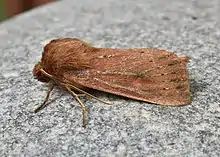| Globia subflava | |
|---|---|
 | |
| Globia subflava, subflava sedge borer, Canada | |
| Scientific classification | |
| Domain: | Eukaryota |
| Kingdom: | Animalia |
| Phylum: | Arthropoda |
| Class: | Insecta |
| Order: | Lepidoptera |
| Superfamily: | Noctuoidea |
| Family: | Noctuidae |
| Subfamily: | Noctuinae |
| Tribe: | Apameini |
| Genus: | Globia |
| Species: | G. subflava |
| Binomial name | |
| Globia subflava Grote, 1882 | |
| Synonyms | |
| |
Globia subflava, the subflava sedge borer or yellow sedge borer, is a moth of the family Noctuidae. The species was first described by Augustus Radcliffe Grote in 1882.[1][2] It is found in North America from Nova Scotia west to British Columbia, south to New Jersey in the east and Utah and California in the west.
The wingspan is 35–40 mm. Adults are on wing in July depending on the location. There is one generation per year.
References
- ↑ Beccaloni, G.; Scoble, M.; Kitching, I.; Simonsen, T.; Robinson, G.; Pitkin, B.; Hine, A.; Lyal, C., eds. (2003). "Globia subflava". The Global Lepidoptera Names Index. Natural History Museum. Retrieved October 23, 2020.
- ↑ Savela, Markku (July 22, 2019). "Globia subflava (Grote, 1882)". Lepidoptera and Some Other Life Forms. Retrieved October 23, 2020.
External links
- Anweiler, G. G. (2007). "Species Details Archanara subflava". University of Alberta Museums. E.H. Strickland Entomological Museum. Retrieved November 14, 2020.
- "932439.00 – 9450 – Globia subflava – Subflava Sedge Borer Moth – (Grote, 1882)". North American Moth Photographers Group. Mississippi State University. Retrieved October 23, 2020.
- "Archanara subflava (Grote, 1882)". The Lepidoptera of Wayne County, Ohio.
This article is issued from Wikipedia. The text is licensed under Creative Commons - Attribution - Sharealike. Additional terms may apply for the media files.